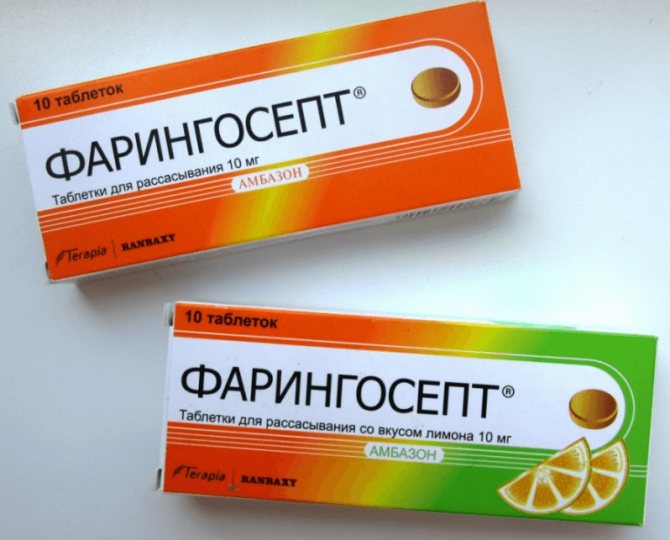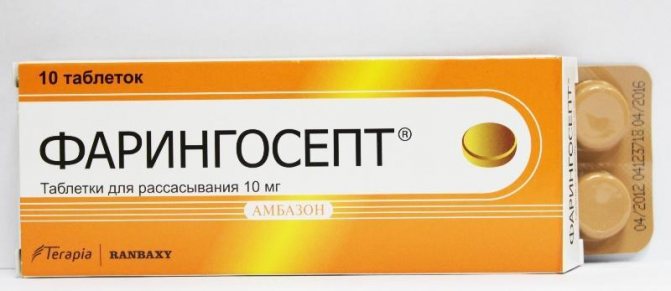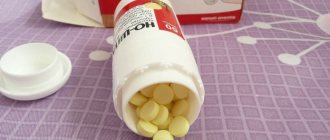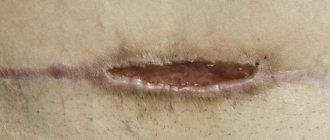Composition and active substance
The active ingredient of the drug is ambazone monohydrate (Ambazone). This antiseptic affects infections of the cocci group, which contribute to the development of diseases of the upper respiratory tract and oral cavity. Faringosept contains excipients - sucrose, polyvidone, lactose, stearic acid and vanillin, thanks to which the drug does not have a negative effect on the intestinal flora, and is also not absorbed into the blood and breast milk.
Faringosept and breastfeeding
Faringosept has a local effect, is not absorbed into the blood and milk, and does not have serious side effects. Therefore, a nursing mother can take the drug without fear. However, before using medications, you should consult with your doctor so that he can prescribe a dosage regimen that is suitable for you and your baby, taking into account the course of the disease and individual characteristics.
Please note that even the safest product can cause allergies in a baby! The instructions for the drug indicate side effects, including an allergic reaction and skin rash. During lactation, you should not take Faringosept with lemon, as lemon contains a strong allergen and often leads to a deterioration in the baby’s well-being.
When taking it, carefully monitor the baby's reaction. If a rash or redness appears, stop taking the tablets. If the drug does not help within three days, consult a doctor!
pharmachologic effect
Faringosept is not an antibiotic; it is an antimicrobial drug that has a local bacteriological effect.
Pharmacodynamics
The drug is active against gram-negative and gram-positive bacteria belonging to the groups Streptococcus haemolyticus, Streptococcus viridans and Pneumococcus.
Pharmacokinetics
Provided that a dosage of 0.03 to 0.05 g of the drug is observed throughout the day, its maximum therapeutic concentration in saliva occurs on the 3rd or 4th day.

Composition and principle of action of the drug
Before you find out whether Faringosept is approved for lactation, you need to determine what the composition of the drug is.
The main component of the drug is ambazone. The substance belongs to anti-inflammatory drugs that have long been used in medical practice.
Auxiliary components include: cocoa, sucrose, lactose, lemon flavor and more. The ingredients of the drug can provoke an allergic reaction not only in the woman, but also in the child.

"Faringosept" is an antiseptic that reduces the development of pathogenic microflora, affecting the process of microbial cell division, slowing it down. As a result, pathogenic microorganisms are weakened, and they become less dangerous to the body.
The main component of the drug, ambazone, does not affect the intestinal microflora and, as a result, does not cause any symptoms of dysbiosis. The disease can disrupt the process of absorption of nutrients in a nursing mother, which can affect the full growth and development of the baby.
Experts have proven that when using Faringosept during lactation, the natural microflora in the mouth is not disturbed. This distinguishes it from antibiotics. The drug does not fight infection; it is used as an antiseptic and disinfects the surface of the mucous membranes of the tonsils, throat and oral cavity.
The drug is effective in combination with antiviral drugs. This is because throat diseases are usually associated with exposure to an immune-compromised body.
Dosage form and manufacturer
Faringosept is intended for resorption; the drug is available in tablets and can be of two types - regular or lemon-flavored (the letter “L” is engraved on one of the surfaces of the tablet).
In the pharmacy chain you can purchase Faringosept from different manufacturers: Pharmacological SA (Romania), Sun Pharmaceutical Industries Ltd. (India) or "Ranbaxy" (India).
Regardless of the manufacturer, the pharmacological properties of the drug, its purpose, and dosage do not change, so the drug cannot harm the health of the baby.
Pros and cons of the drug
Faringosept is particularly effective at the very beginning of the disease. If a nursing mother has one of the diagnoses confirmed (chronic tonsillitis and a sore throat indicates its exacerbation), then she needs to start taking the drug immediately at the first symptoms.
One of the advantages is that Faringosept can be used during lactation without fear of a negative effect on the intestinal microflora.

At the height of the disease, the medicine will also have a positive effect, but it will not be as obvious. In this situation, bacteria will have time to multiply and cause serious harm to the woman’s body. The active ingredient will help get rid of pathogenic microflora, but a little longer.
Indications for use
The drug is used to treat diseases of the upper respiratory tract or oral cavity, for example:
- inflammation of the mucous membrane of the gums or mouth (gingivitis, stomatitis);
- inflammatory process in the tonsils or oropharynx (tonsillitis, pharyngitis).

It is possible to take Faringosept during lactation to relieve symptoms and sensations provoked by the development of an acute respiratory viral infection.
What diseases does Faringosept fight?
The most well-known throat diseases include:
- Gingivitis. The main signs are inflammation of the gums in the form of swelling, redness and bleeding.
- Stomatitis. The main symptoms are inflammation of the oral mucosa.
- Tonsillitis. Inflammation of the tonsils occurs, caused by exposure to bacteria or viruses.
- Laryngitis. The main symptoms are inflammation of the mucous membrane of the larynx and vocal cords.
- Pharyngitis. Inflammation in the mucous membrane and lymphoid tissue of the pharynx.

The drug can also be used to prevent throat diseases.
Can it be used during lactation?
When using the drug in the initial stage of the disease, you can avoid taking other antibacterial agents that are not compatible with breastfeeding. Faringosept is an indispensable treatment when breastfeeding a baby; the drug is popular among nursing mothers.
How does it affect breast milk production?
The unique composition of the product prevents the absorption of the active substance into the blood; therefore, Faringosept does not affect the process of breast milk production.

The effect of the drug on the baby
Since the components that make up this drug are not absorbed into breast milk and blood, but have a local effect, they are not contraindicated during breastfeeding. Faringosept is absolutely safe for the health of babies.
Indications and contraindications
During breastfeeding, it is important to find a reliable, safe remedy that will allow the mother to quickly cope with problems without fear for the baby’s health.
Faringosept is effective for the following ailments:
- Tracheitis;
- Gingivitis;
- Stomatitis;
- Angina;
- Pharyngitis.
Doctors prescribe the drug as postoperative therapy. The product effectively fights bacteria and relieves inflammation. The safety of the drug during pregnancy and breastfeeding makes it popular. Even the safest product must be used taking into account the correct dosage and strictly follow the doctor’s instructions.
We recommend reading: Hemorrhoids after childbirth, treatment while breastfeeding
The composition does not affect the functioning of the gastrointestinal tract, is not addictive, can be used for complex therapy, and can completely block the spread of bacteria with timely treatment.
The substance has a minimum of side effects and contraindications. Allergic reactions to the active ingredients are possible. Patients with diabetes should use it with caution.
Instructions for use and dosage
According to the instructions, the product should be used 15-20 minutes after eating. After resorption of the tablet, it is forbidden to drink or eat for 1.5-2 hours. The daily dose of the drug ranges from 3-5 tablets, depending on the patient’s condition. The duration of treatment through the use of tablets is from 5 to 7 days.
If after a 3-4 day period of treatment with Faringosept the condition does not improve, you should consult a doctor.

How to take the drug correctly
Nursing mothers are wondering whether Faringosept can be taken in tablet form during lactation. To maintain the health of the baby and the woman, the drug must be used according to the instructions. You are allowed to take 1 tablet 3 to 5 times a day. They must be absorbed until completely dissolved within 15-30 minutes after eating. Tablets are not recommended to be taken orally or washed down with water. They have a pleasant chocolate or lemon taste.
To achieve a positive result, experts recommend not eating any food within 3 hours after taking it.
Within 3-4 days from the start of taking Faringosept during lactation, a positive therapeutic effect occurs.
Drug substitutes
There are no analogues of tablets, the composition of which is the same as the original drug in terms of the active substance. However, there are many drugs that have identical pharmacological effects.
Pharmacy medicines
Among the medications, analogues of Faringosept include the following:
- Sprays – Angilex, Hexasprey, Kameton.
- Tablets and lozenges – Decathylene, Septefril, Givalex.
- Tinctures – tincture of ginseng, oil tincture of chlorophyllipt.

These drugs have antibacterial and anti-inflammatory properties, just like Faringosept, which is why they can be used during breastfeeding. Before using analogues, you must consult with a specialized specialist.
Folk remedies
The possibility of using folk remedies for the development of diseases of the oral cavity or upper respiratory tract during lactation cannot be ruled out. The most famous include the following:
- decoctions of chamomile, rose hips, linden, which are used as a rinse;
- tea made from linden flowers or rose hips - drunk warm, with the addition of honey or lemon.
Achieving a positive result without harming the baby’s health is possible only with moderate use of folk remedies, as well as after consultation with a doctor.
Features of taking the drug during lactation
The period of breastfeeding is a responsible time for a woman. During these months, she protects the baby from an aggressive environment for which he is not yet ready.
Unpleasant sensations in the mouth and throat may indicate the onset of various pathologies. Therefore, if the symptoms of the disease are visible, it is important for a woman to start treatment on time. In this case, you should definitely consult a specialist.

The main indication for taking Faringosept during lactation is a sore throat. Thanks to the main component of the drug - ambazone - it is well tolerated and acts locally.
In this regard, it is not contraindicated for nursing mothers, because the percentage of the medicine transferred to the baby’s body is very small.
Inflammatory processes in the throat are not a reason to stop breastfeeding. The contraindications of the drug do not include periods of lactation and pregnancy. But it is recommended to take it only as prescribed by a doctor.
Faringosept is a medicine that is used as a prophylaxis and for the treatment of infections of the mouth and larynx. Experts have a positive attitude towards it and often prescribe it to women during breastfeeding.
The drug is able to fight pathogens such as streptococci, pneumococci and staphylococci. According to research, Faringosept is also particularly effective against the pathogenic yeast fungus Candida.
Why is the drug dangerous?
Faringosept has earned a good reputation in medical practice. It has been actively used in our country since the 80s of the last century.
There is no precisely established data on the effect of the drug on the health of infants. Considering that it acts primarily in the oral cavity, when Faringosept is used during lactation according to the instructions, it cannot negatively affect the baby.
Experts note that the drug has only minor side effects in the form of an allergic reaction, which can negatively affect both the mother and the child.

Contraindications for Faringosept include:
Therefore, in case of existing restrictions, taking Faringosept should be abandoned.










